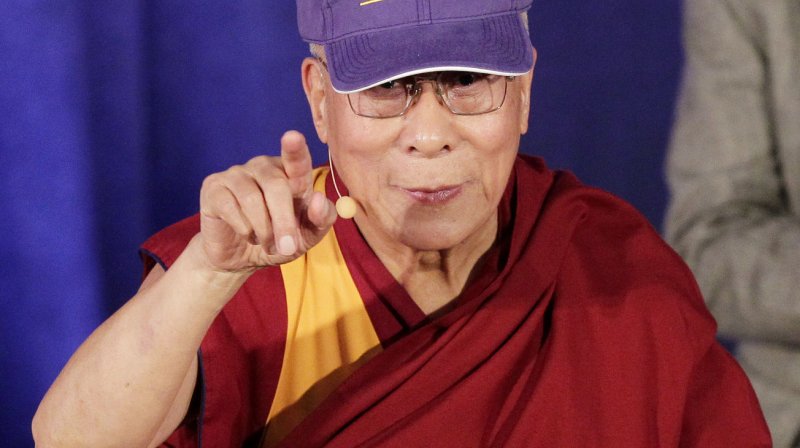His Holiness the 14th Dalai Lama, Tenzin Gyasto, places a Hunter college hat on his head on stage at Hunter College where he received an honorary degree, a Doctor of Humane Letters, on October 19, 2012 in New York City. In 1989 he was awarded the Nobel Peace Prize for his non-violent struggle for the liberation of Tibet. UPI/John Angelillo |
License Photo
BEIJING, Nov. 12 (UPI) -- China has excoriated Tibetan spiritual leader the Dalai Lama, saying his behavior is "despised by the Chinese people."
Chinese Foreign Ministry spokesman Hong Lei said the Dalai Lama's "gummy performance" in Japan shows he is intent on "betraying his motherland and engaging in activities to split China under the guise of religion."
Hong made the comment when asked about the Dalai Lama referring to the Diaoyu Islands by their Japanese name Senkaku Islands at a recent news conference in Yokohama, Japan, a report by the Chinese state-run news agency Xinhua said.
"To achieve his goal of splitting China, the Dalai Lama would rather collude with Japanese right-wing forces. His behaviors are despised by the Chinese people," Hong said.
China and Japan -- as well as Taiwan -- have been at loggerheads over ownership of the South China Sea islands controlled by Japan.
The Diaoyu Islands and their accompanying rocky outcrops are around 100 miles north of Japan's Ishigaki Island and 116 miles northeast of Taiwan.
At the end of World War II in 1945 the islands were under U.S. jurisdiction as part of the captured Japanese island of Okinawa but they have been under Japanese jurisdiction since 1972 when Okinawa was returned to Japan.
Ownership of many of the South China Sea islands brings with it rights over the increasingly important oil and natural gas fields on the seabed, as well as fishing rights.
Chinese naval vessels and fishing boats have been making an increasing number of visits to waters near the Diaoyu Islands this year.
This week Japan's Kyodo news service reported that for the 24th day in a row Chinese maritime surveillance vessels sailed in an area just outside Japanese territorial waters around the Diaoyu Islands.
Kyodo also reported that during the Dalai Lama's visit to Okinawa he called for peace through dialogue in the 21st century and that and that respect for different views are important.
The Kyodo report said the Dalai Lama didn't refer to the Chinese government, which accuses him of being behind recent acts of self-immolation by Tibetans protesting Beijing's rule.
Earlier this month China lodged a formal diplomatic protest with the Japanese embassy over the Dalai Lama's 10-day visit -- his 18th -- to Japan.
Beijing said it considered the Dalai Lama was "colluding with international anti-China separatist forces to undermine relations between China and other countries so as to split the nation," Xinhua reported.
The Chinese government considers the Dalai Lama to be encouraging self-immolations in Tibet as a protest against Tibet being an integral part of China.
The mountainous kingdom has been under Chinese rule since the communist government's army marched into the region in 1950s and the Dalia Lama fled to India where he resides.
Dozens of self-immolations have taken place, many of them fatal, within Tibet, mostly in near Lhasa, in neighboring Tibetan areas of Sichuan, Gansu and Qinghai provinces.
Chinese officials have claimed the Dalai Lama uses "the spate of self-immolations over the past year" to gain him wider international attention," Xinhua reported this year.
But in an exclusive interview with the BBC in November last year, the Dalai Lama denied Beijing's accusations that he actively encourages Tibetans to self-immolate. He questioned the usefulness of the acts as a protest tool against the Chinese authorities and their more than 50 years of rule in Tibet.
"There is courage -- very strong courage" by the people who set themselves on fire. "But how much effect? Courage alone is no substitute. You must utilize your wisdom," he told the BBC.
China also recently criticized Navi Pillay, the U.N. High Commissioner for Human Rights, saying his remarks surrounding the self-immolations were an interference in China's domestic affairs.
"We are dissatisfied with and strongly opposed to the high commissioner's statement," said Hong.
"The (Dalai Lama) clique has talked black into white, passed the buck to the Chinese government and made accusations about China's national and religious policies," he said.





